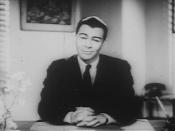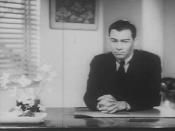The Blindness of the Non-Blind
The short story "Cathedral" by Raymond Carver displays one man's new found understanding and acceptance of a blind man over a relatively short period of time. The narrator represents the story's dominant theme of overcoming fear and prejudice of the blind through personal experience as well as mutual respect. The narrator who remains nameless throughout the play holds deeply unfounded beliefs and stereotypes of what a blind person should be, yet through various stages of transformation he develops a bond with Robert, the blind man whom at first he privately mocked and feared. The narrator is ill at ease with the idea of having a blind man in his home; however, through various stages of transformation he quickly begins to warm up to Robert as a person, not simply as a blind man. When the narrator's stereotypes of the blind are discredited, he reaches his first stage of transformation.
This allows him to progress to his second stage with the realization that Robert is a capable human being. The final two stages come when the narrator allows his mind to let go of all of its prejudices and allows himself to identify with and understand Robert through his handicap.
The first stage of transformation for the narrator is that his preconceived notions about blind people are proven false when he meets Robert for the first time. The narrator is not looking forward to having a blind man stay at his house. But once Robert arrives at the narrator's home, the narrator is shocked that Robert does not conform to the narrator's idea of the blind. When Robert gets out of the car himself without any help, this action really goes against the narrator's ideas of a slow moving blind man. The narrator now...


